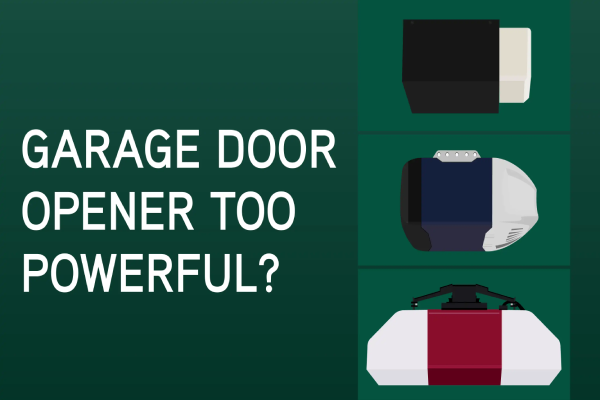
You may be under the impression that the more powerful your garage door opener is, the better it is for your garage system. However, if you're not careful, you could end up with a garage door opener that is too powerful for your garage door, which could cause issues for your system in the future.
We explore the following topics to help you purchase the right opener for your garage door:
- 4 Consequences of Using a Garage Door Opener That's Too Powerful
- Choosing the Right Garage Door Opener for Your Garage Door
- FAQs about Garage Door Openers that are Too Powerful
4 Consequences of Using a Garage Door Opener That's Too Powerful
Before you purchase a new garage door or opener, it's essential to ensure your door and opener are compatible. Below are four unfortunate consequences of using a garage door opener that's too powerful for your door type.
-
Safety Hazards:
If your opener applies too much force when opening or closing your garage door, it can cause the door to slam down forcefully or move too quickly. Sudden movements like these can damage your property or harm anything or anyone that is in the path of your garage door. -
Premature Wear and Tear:
An opener that overworks your garage system can cause your system's parts to wear down faster, costing you more money for part repair and placement. -
Excessive Noise:
The excess power from your opener can cause loud and disruptive noise during operation of your door — something your neighbors may not appreciate. -
Unbalanced Garage Door:
The force generated by your opener can cause your garage door to become unbalanced. Typically, an unbalanced garage door leads to track misalignment, which can cause safety issues and decrease the lifespan of your garage door system over time.
Choosing the Right Garage Door Opener for Your Garage Door
So, how do you choose a garage door opener that isn't too strong for your garage door? The first step is to consider the size of your garage door opener. Your opener's size is determined by its horsepower. Review the chart below for highlights of each garage door opener size:
| Size Measured in HP | Features |
|---|---|
| 1/3 HP opener | Budget-friendly, generally used for single garage doors, suitable for lighter garage door materials such as steel, fiberglass, or aluminum, may require more repairs down the line. |
| 1/2 HP opener | Most popular option, suitable for single or double garage doors, can lift most garage doors. |
| 3/4 HP opener | Most expensive option, suitable for oversized or heavy doors, for heavier garage door materials such as wood, generally requires fewer repairs. |
Still unsure about whether your garage door opener is too powerful for your door? Find a garage door professional nearest you for personalized advice about which opener works best for your door type.
FAQ About Powerful Garage Door Openers
Can a garage door opener with too much power be adjusted?
Yes, a garage door opener with too much power can often be adjusted to reduce its force. Adjusting the opener's power level is a common practice when the opener exerts excessive force during door operation.
This adjustment process typically involves modifying the opener's settings to reduce the amount of force it applies when opening and closing the door. However, the extent to which an opener can be adjusted depends on the opener model and its features.
Many modern garage door openers come equipped with settings or controls that allow for adjustments. These settings might include options for adjusting the opener's force sensitivity, speed, and travel limits. Reducing the force sensitivity setting can help decrease the force exerted by the opener, making it safer and more suitable for your door. However, it's essential to follow the manufacturer's instructions and guidelines for adjustments, as improper adjustments can lead to safety concerns.
In some cases, if the opener's power is too high for your door and can't be adjusted, it may be more practical to consider replacing the opener with one that offers the appropriate lifting capacity.
Contact a garage door professional to assess your opener and advise whether you should adjust or replace it. Ultimately, safety should be a top priority, and adjustments should be made carefully to prevent any risks associated with excessive opener force.